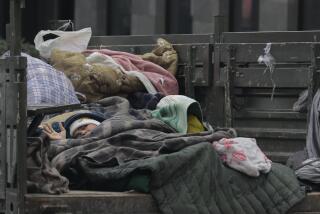Post-Soviet Free Fall Appears Ended for Most of Region
- Share via
KANT, Kyrgyzstan — Alexander Chaichenko was up at 4 a.m., long before the sun revealed the flat, boundless steppe. He spent the morning rebuilding a tractor from old parts. Then he gathered seeds for the new planting season. Late into evening he was pouring a concrete floor for a barn.
Six decades after Stalin forced his grandparents onto a Soviet collective, Chaichenko is working harder than ever--for himself. He produces nearly twice as much wheat per acre as the state farm he abandoned three years ago.
“When I got this land, I was penniless,” said the farmer, who now has 50 sheep, 25 cows, 20 horses, one sheep dog and enough profit to build a small mill and a bakery.
“You cannot say I’m wealthy,” he added with a wry smile, “just no longer lazy and poor.”
Chaichenko, 34, whose Russian ancestors settled here in the 1860s, is a pioneer in the wobbly free markets of post-Soviet Central Asia. Thanks to his 75-acre farm and hundreds of others now in private hands, food output is growing in Kyrgyzstan for the first time in five years of independence.
The economic crash that followed Moscow’s cutoff of subsidies in early 1992 appears to be over in Kyrgyzstan, Kazakhstan, Uzbekistan and Turkmenistan, which all recorded slight growth this year. Only war-torn Tajikistan, the region’s other country, is still in free fall.
But the rally is weak, and economists say it will take the Central Asians years, maybe decades, to recover even the modest living standards they had at the bottom of the Soviet scale. Among the obstacles: the region’s colonial legacy, landlocked isolation and resistance to reform.
The Soviets turned their deep south into a vast cotton plantation, leaving the new countries too dependent on the crop. Uzbekistan and Turkmenistan are planting more grain, trying to become self-sufficient in basic foods, but the cost is billions of dollars in lost cotton exports.
Both countries, plus Kazakhstan, are rich in gas and oil, but Russia still controls their only pipelines and siphons off export revenue. Turkmenistan’s dreams of Kuwait-style prosperity depend on a proposed gas pipeline to the Indian Ocean, but fighting in Afghanistan threatens that project.
Kazakhstan achieved a compromise deal this month to pump its oil across Russia through a new pipeline to be owned jointly by the two countries and some Western oil companies, which had threatened to bypass the Russians with an alternate route.
Still, the Kazakh oil payoff is years away, as is a Canadian gold mine in Kyrgyzstan and other promising investment in the region.
“It’s impossible to live here without being patient,” said Karlygh Imanbekova, a school principal in Kazakhstan, where power blackouts are frequent this winter and public employees wait months to be paid.
In return for Western aid and loans, the Central Asians must listen to the International Monetary Fund’s advice to slash public spending even more and free their economies from the state.
But President Islam Karimov still runs the Uzbek economy by decree, forcing farmers to sell to the state at below-market prices. Like his Kazakh and Turkmen counterparts, he is only starting to sell off state property.
In Turkmenistan, President Saparmurad A. Niyazov is cutting back on promised free gas, electricity and water for his people but is spending nearly $1 billion on grandiose palaces and other construction that serves his personality cult.
*
Only Kyrgyzstan, with no oil or gas to finance a slow transition, has embraced “shock therapy.” It quickly ended state monopolies on grain, bread and food processing, allowing farmers like Chaichenko to sell at market prices, and auctioned off nearly 1,500 state companies.
People everywhere are turning to capitalism on their own--for survival. A drive through the region found merchants crouching until late at night by roadside offerings of cigarettes, food or gasoline, barely visible under dim lightbulbs strung from power lines.
“We’re just starting now,” said Nurmuhamed Muhamedov, 40, a Turkmen rug vendor. “Come back in another five years and you’ll see a real difference.”
More to Read
Sign up for Essential California
The most important California stories and recommendations in your inbox every morning.
You may occasionally receive promotional content from the Los Angeles Times.













